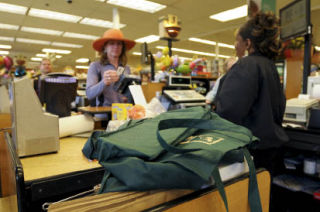Next year, Seattle will become one of the first major American cities to discourage the use of paper and plastic shopping bags. On July 28, the Seattle City Council voted 6-1 to institute a 20-cent fee for the use of paper and plastic bags at grocery, drug and convenience stores. Although the measure only applies to Seattle merchants, eco-conscious Island shoppers are jumping on the bandwagon as well.
Over the past several months, Island grocers have seen a noticeable increase in the number of reusable bags passing through check-out stands. From Albertsons to Walgreens to QFC, Island residents are making conscious efforts to bag paper and plastic, turning to cloth instead.
“Islanders are by and large very socially conscious and ecologically minded,” said Mercer Island Mayor Jim Pearman, adding that the city has no plans of introducing its own bag fine. “They don’t need an ordinance or law [to reuse bags]. They just do it.”
Ryan Auld, supervisor at the North-end QFC, said the number of shoppers toting cloth grocery bags has nearly doubled over the past few months.
“Probably one out of every six customers brings in a bag,” he said. “When I started working here a year and a half ago, it was about one out of 15.”
In an effort to support Washington’s movement to “go green,” QFC offers reusable bags for 99 cents. The chain also offers an eco-friendly coupon: Shoppers who bring in 10 plastic bags to be recycled receive a reusable QFC bag for free. The bags, which are 100 percent non-woven polypropylene, can fit more than the average paper sack and are twice as durable. Shoppers no longer have to worry about their bags tearing open and groceries tumbling to the floor.
So far, the green sacks have been a success.
“There’s definitely an effort to go green,” Auld said. “Some customers buy a new bag every time they come in without a reusable — kind of a way of punishing themselves for forgetting to bring one.”
Yet QFC cashiers favor the method of reward over punishment. If Auld sees a clearly worn polypropylene bag, he will offer the customer a new one, free of charge.
“We’re pretty good about giving them away,” the supervisor said. “We try to do our part.”
And it’s not only QFC. Albertsons is also promoting the use of cloth bags. In fact, the grocery store has posted a sign on the front of each entrance asking, “Did you remember your cloth bag?”
Cashiers also reimburse shoppers five cents for every paper or cloth grocery bag they reuse. Plastic is not accepted.
Although employees at Albertsons agree that more and more Islanders are saying “neither” when it comes to paper or plastic, cashier Andy Maloof said that many residents are opposed to Seattle’s 20-cent fine.
“Next to gas prices, it’s the number one topic people are grudging about,” Maloof said.
The cashier added — on a humerus note — that the bag fine is a surefire way to tell a Republican from a Democrat.
“If they are grudging about it then they’re Republican. They think it’s a tax. If they’re Democrat, they’re gung-ho about the idea. It’s remarkable but it’s true,” he said with a smile.
Republican or Democrat, Island shoppers have little to worry about. The 20-cent tax, which will be introduced on Jan. 1, 2009, will only apply to Seattle grocery, drug and convenience stores. So far, according to Pearman, no other Eastside cities plan on passing such a law. “But it doesn’t mean there’s no interest,” he was quick to add, “A couple of [MI Councilmembers] are very sensitive to the issue.”
Yet Pearman believes that Islanders will go out of their way to reduce and reuse without overlying legislation. Mercer Island was the first Eastside city to introduce a recycling center in the 1970s, he pointed out. And since then, the Island’s eco-conscious spirit has only grown.
“People just look around and feel the need to do something,” the mayor said.



